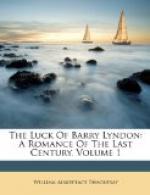My second day’s journey—for the Irish roads were rough in those days, and the progress of a gentleman’s chariot terribly slow— brought me to Carlow, where I put up at the very inn which I had used eleven years back, when flying from home after the supposed murder of Quin in the duel. How well I remember every moment of the scene! The old landlord was gone who had served me; the inn that I then thought so comfortable looked wretched and dismantled; but the claret was as good as in the old days, and I had the host to partake of a jug of it and hear the news of the country.
He was as communicative as hosts usually are: the crops and the markets, the price of beasts at last Castle Dermot fair, the last story about the vicar, and the last joke of Father Hogan the priest; how the Whiteboys had burned Squire Scanlan’s ricks, and the highwaymen had been beaten off in their attack upon Sir Thomas’s house; who was to hunt the Kilkenny hounds next season, and the wonderful run entirely they had last March; what troops were in the town, and how Miss Biddy Toole had run off with Ensign Mullins: all the news of sport, assize, and quarter-sessions were detailed by this worthy chronicler of small-beer, who wondered that my honour hadn’t heard of them in England, or in foreign parts, where he seemed to think the world was as interested as he was about the doings of Kilkenny and Carlow. I listened to these tales with, I own, a considerable pleasure; for every now and then a name would come up in the conversation which I remembered in old days, and bring with it a hundred associations connected with them.
I had received many letters from my mother, which informed me of the doings of the Brady’s Town family. My uncle was dead, and Mick, his eldest son, had followed him too to the grave. The Brady girls had separated from their paternal roof as soon as their elder brother came to rule over it. Some were married, some gone to settle with their odious old mother in out-of-the-way watering-places. Ulick, though he had succeeded to the estate, had come in for a bankrupt property, and Castle Brady was now inhabited only by the bats and owls, and the old gamekeeper. My mother, Mrs. Harry Barry, had gone to live at Bray, to sit under Mr. Jowls, her favourite preacher, who had a chapel there; and, finally, the landlord told me, that Mrs. Barry’s son had gone to foreign parts, enlisted in the Prussian service, and had been shot there as a deserter.
I don’t care to own that I hired a stout nag from the landlord’s stable after dinner, and rode back at nightfall twenty miles to my old home. My heart beat to see it. Barryville had got a pestle and mortar over the door, and was called ‘The Esculapian Repository,’ by Doctor Macshane; a red-headed lad was spreading a plaster in the old parlour; the little window of my room, once so neat and bright, was cracked in many places, and stuffed with rags here and there; the flowers had disappeared




